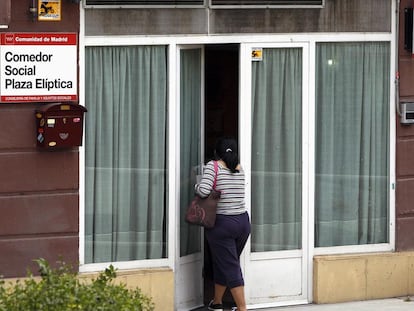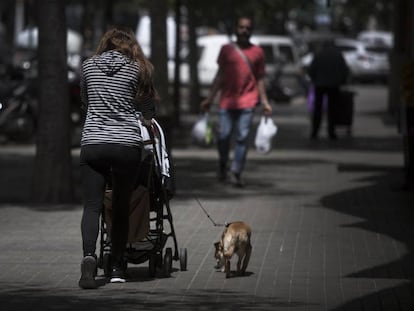Spain among worst performers in Europe on income equality: EU report
Madrid also criticized for failure of poverty-reduction measures and elevated school drop-out rate

First the good news: the Spanish economy is on the mend, unemployment is falling and the number of people at risk of poverty is coming down too. That¡¯s according to the European Commission¡¯s new Draft Joint Employment Report 2018.
But despite the positives, the Commission¡¯s report has also given Spain a failing grade when it comes to income equality, describing the situation as ¡°critical¡± ¨C that is, ¡°much worse than average, and either not improving sufficiently fast or deteriorating further.¡±
The Commission has criticized Madrid for the failure of its poverty-reduction policies to make a significant impact
This places the country in a bottom group of poor performers that also includes Bulgaria, Lithuania and Greece.
Across the whole 28-member bloc, the richest 20% of the population had a disposable income that was around five times higher than that of the poorest 20% in 2016, according to the Commission report. In Spain, however, this figure was slightly above six-and-a-half times.
And despite Spain¡¯s economic recovery ¨C the national economy outperformed expectations to grow 3.2% in 2016 ¨C the Commission highlighted the fact that the country has yet to recover the equality levels seen before the crisis.
In total, a third of the countries in the EU have not recovered this pre-crisis equality level, according to the report, which analyzes 14 social indicators ¨C from youth unemployment levels and the gender employment gap, to school drop-out rates.
Spain appears to have improved in terms of digital competencies and for compensation for hours worked
¡°Recent gains in employment have not been evenly distributed among different population groups,¡± the report says of the EU as a whole. ¡°The gap in employment rates between low-skilled and high-skilled workers is large (31 percentage points), underlining the need to invest in skills to better respond to changing labor-market needs,¡± the report adds.
¡°The persistence of relatively large income inequalities, often linked to unequal opportunities in access to education, training and social protection, and reflecting poor labor market outcomes, raises concerns in terms of fairness, social inclusion and sustainable growth,¡± the report¡¯s authors go on to say.
On the ¡°to watch¡± list
In terms of the risk of poverty, Spain has improved its record in recent years but remains on the watch list. For employment, the country¡¯s performance has been noted as ¡°weak but improving, while the report notes that the number of ¡°quasi-jobless¡± households remains a high 14.9%.
The Commission also criticizes Madrid for the failure of the Spanish government¡¯s poverty-reduction policies. Social transfers (¡°social assistance provided by public and civic bodies to those living in poverty or in danger of falling into poverty¡±) reduced monetary poverty by just 25% in Spain, before taking pensions into account. That figure is too close to Bulgaria and Greece and a long way from the 50% seen in Nordic countries.
The report calls on countries including Spain to introduce a raft of measures including improving the design of tax and benefit systems, ensuring access to quality healthcare and promoting gender equality.
Spain¡¯s school drop-out rate also comes in for criticism. At 19%, this is a long way from the 10.7% EU average, while the number of young people who are neither working nor studying is at 15%, four percentage points above the EU average.
On the plus side of the ledger, Spain appears to have improved in terms of digital competencies and for compensation for hours worked. Spain also ranks well in terms of the number of children aged under three in formal childcare and in self-reported access to healthcare
Pensions: a generational flashpoint
The European Commission report warns that an ageing population "implies more pressure on younger generations ¨C those same generations who experience also a more difficult access to stable, quality jobs ¨C in order to guarantee sufficient revenues to the pension systems and ensure their sustainability." Ageing societies will mean longer working lives and this will put pressure on the pensions system in future because of the longer periods worked.
This has led Brussels to issue a warning on a possible lack of trust between generations and possible risks to the social contract, which states that pensions paid in today will be received in future. To reduce the threat, the European Commission says employment and productivity rates must be increased, while stressing the benefits of private pension funds. The report also notes that women are more likely to be affected on the pensions front as they interrupt their careers for childcare reasons.
English version by George Mills.
Tu suscripci¨®n se est¨¢ usando en otro dispositivo
?Quieres a?adir otro usuario a tu suscripci¨®n?
Si contin¨²as leyendo en este dispositivo, no se podr¨¢ leer en el otro.
FlechaTu suscripci¨®n se est¨¢ usando en otro dispositivo y solo puedes acceder a EL PA?S desde un dispositivo a la vez.
Si quieres compartir tu cuenta, cambia tu suscripci¨®n a la modalidad Premium, as¨ª podr¨¢s a?adir otro usuario. Cada uno acceder¨¢ con su propia cuenta de email, lo que os permitir¨¢ personalizar vuestra experiencia en EL PA?S.
?Tienes una suscripci¨®n de empresa? Accede aqu¨ª para contratar m¨¢s cuentas.
En el caso de no saber qui¨¦n est¨¢ usando tu cuenta, te recomendamos cambiar tu contrase?a aqu¨ª.
Si decides continuar compartiendo tu cuenta, este mensaje se mostrar¨¢ en tu dispositivo y en el de la otra persona que est¨¢ usando tu cuenta de forma indefinida, afectando a tu experiencia de lectura. Puedes consultar aqu¨ª los t¨¦rminos y condiciones de la suscripci¨®n digital.










































